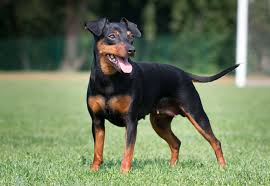
Miniature Pinscher
Conditions of detention
Miniature Pinschers are adaptable and can live comfortably in both apartments and houses with yards. They require regular exercise and mental stimulation to prevent boredom.
Useful Fact: Min Pins are well-suited for urban living due to their small size, but they need daily walks and playtime.
Nutrition and diet
A balanced diet of high-quality dog food suitable for their age, size, and activity level is essential for Miniature Pinschers. Monitoring their food intake helps prevent obesity.
Useful Fact: Due to their small size and active nature, Miniature Pinschers may benefit from a diet rich in protein to maintain muscle mass and energy.
Health
Miniature Pinschers are generally healthy, but they can be prone to certain genetic conditions such as patellar luxation, hip dysplasia, and eye issues. Regular veterinary check-ups are crucial.
Useful Fact: Regular dental care is important for Min Pins to prevent periodontal disease, which is common in small breeds.
Grooming and care
Miniature Pinschers have a short, smooth coat that is easy to maintain. Regular brushing helps remove loose hair and keep their coat healthy. They are low shedders.
Useful Fact: Min Pins have a tendency to feel cold due to their short coat, so they may need a sweater in cooler weather.
Education and training
Miniature Pinschers are intelligent but can be stubborn. Early socialization and consistent, positive reinforcement training are essential to manage their independent nature.
Useful Fact: These dogs respond well to engaging training sessions that include plenty of mental stimulation.
Toys and entertainment
These energetic dogs enjoy a variety of toys, including fetch toys, chew toys, and puzzle games. Regular playtime and mental stimulation are important to keep them happy and healthy.
Useful Fact: Providing durable chew toys can help satisfy their natural chewing instinct and prevent destructive behavior.
Safety
Ensure your home and yard are secure, as Miniature Pinschers are curious and can be escape artists. Always use a leash when walking in unsecured areas to prevent them from wandering off.
Useful Fact: Their small size and agility make it easy for them to slip through small gaps, so secure fencing is important.
Accessories
Basic accessories include a comfortable collar, leash, and identification tags. They also benefit from a cozy bed, appropriate-sized crate, and grooming tools.
Useful Fact: A harness can provide better control during walks and reduce strain on their neck.
Socialization
Early and ongoing socialization with people, other dogs, and various environments is important for Miniature Pinschers. This helps them grow into well-rounded and confident dogs.
Useful Fact: Puppy socialization classes can help expose your Miniature Pinscher to new experiences in a controlled environment.
Travel and Transportation
Miniature Pinschers are good travelers if accustomed to it from a young age. Use a secure crate or a seatbelt harness for car rides to ensure their safety.
Useful Fact: Regular breaks during long trips help keep your Miniature Pinscher comfortable and reduce travel stress.
Behavior and psychology
Miniature Pinschers are known for their lively, intelligent, and sometimes stubborn nature. They form strong bonds with their families and thrive when given regular physical and mental stimulation.
Useful Fact: Understanding their need for companionship and activity can help prevent behavioral issues such as separation anxiety or destructive behavior.
Legal aspects
Ensure compliance with local pet ownership laws, including licensing and leash regulations. Keep their vaccinations and identification up to date.
Useful Fact: Some areas may have breed-specific regulations, so it’s important to stay informed about local laws regarding Miniature Pinschers.


